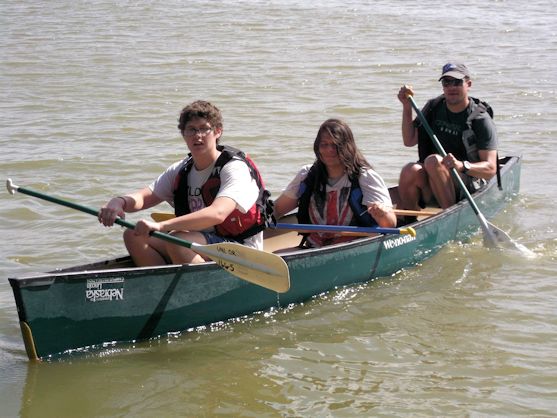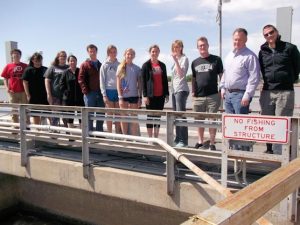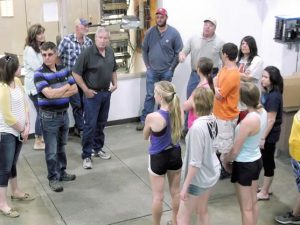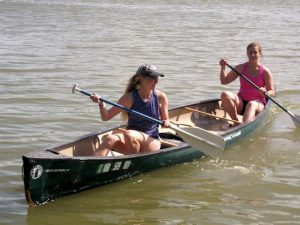UNK Research Students Complete 15th Annual Project Tour

Students from the University of Nebraska-Kearney had the opportunity to expand their knowledge of Nebraska’s natural resources during a tour of The Central Nebraska Public Power and Irrigation District’s hydropower-irrigation project on May 29 and June 1.
It was the 15th annual UNK tour, a milestone that demonstrates a commitment by several individuals who have been of UNK’s Summer Student Research Program (SSRP) over the years, perhaps none moreso than John Falconer, director of the Office of Sponsored Programs. Falconer has organized UNK’s participation in the tour of Central’s project each year since the tour’s inception, including making the trek to Lincoln to transport canoes for a trip down Central’s Supply Canal (more about that later).
The SSRP supports independent student research and scholarly activity each summer. It is open to students from all disciplines, and is structured to enrich the educational experience in several ways.
First, SSRP enables students to engage in original research and creative activity under the guidance of a faculty mentor. This opportunity to work closely with an expert gives the student a chance to expand their knowledge of a chosen academic discipline. Also, because the research is independent of a structured classroom setting, students experience the excitement and challenges of applying their knowledge and skills to solve problems. Finally, students draw on their general studies coursework and learn about research in other disciplines, broadening their understanding of the differences and connections between various fields of study.

Students and faculty mentors pose for a photograph atop the headgates of the Supply Canal near North Platte.
The tour of Central’s project provided students – most of whom had no background in agriculture or natural resources – a first-hand look at how water resources provide multiple benefits to Nebraska. The tour stopped at several sites and facilities within the District to see examples of these benefits.
The students first visited a site where irrigation water is applied to fields through a sub-surface drip system. The water is diverted from a small irrigation lateral through a filter system and then through buried drip lines to the crop’s root system. SDI irrigation is extremely efficient in that it reduces evaporation and deep percolation losses that may be present with other irrigation methods. Nitrogen fertilizer can also be applied through the system, literally spoon-feeding nutrients to the growing crop during the irrigation process. Producers employing SDI systems regularly see equal or better yields from SDI acres as compared to pivot-irrigated fields with generally less application of water.

Four to a wrench: Young ladies from the UNK Summer Student Research Program hoist one of the wrenches on hand for maintenance at the Kingsley Hydroplant. And it’s not even the biggest wrench!
The group also examined (briefly, because of a passing rain shower!) an example of “outside-the-box” thinking during a stop at a “drop-span” pivot system. The pivot, which can use either water from Central’s canal system, or from an irrigation well, is located on a half-section that includes obstacles that prevent the pivot from reaching a portion of the field. The solution, implemented by the producer and a local pivot dealer, was to install a pivot that allowed the producer to disconnect spans and towers to allow the pivot to reach more than 30 acres that were previously unable to be covered by the pivot. The pivot then reverses, stops at the location where the spans were dropped off, picks up the disconnected spans (with minimal labor by the producer), and continues over the rest of the field.
The group also stopped at a site that is part of the E67 Telemetry Project. The E67 Canal system includes three miles of membrane-lined canal; the rest of the delivery system was converted from open laterals to buried pipelines several years ago. Each turnout in the E67 area (approximately 6,000 acres) is equipped with UHF radio transmitters, digital flowmeters and rain gauges powered by and solar panels. Two automated weather stations measure wind speed and direction, temperature, relative humidity, net solar radiation, and precipitation to calculate evapotranspiration rates of the crops.
The data is transmitted to a base station at the nearby Johnson No. 1 Hydroplant and then via the internet to a McCrometer server where sorting and calculations are done. Field data and graphs can be picked up online by a producer’s PC, tablet or smartphone that has internet access.
The data allows precision irrigation management of these fields which saves water. Producers can start each morning with an up-to date view of graphs that show their field water balances. The information allows the producer to know where and when they need to start irrigating. Additionally, in a rain event, they will know total rainfall for the day, accumulated every 15 minutes on each field (or a nearby one) and know which irrigation systems can be shut down immediately or if they should keep running through a small rain event. There should never be water stress on a field again.
Additional components are available and producers have the option to add such equipment as pressure gauges, soil moisture probes, pivot lateral position, etc. The E67 Telemetry Project came about as a cooperative venture by Central, McCrometer, UNL Extension and the Nebraska Environmental Trust Fund.
From there, the group journeyed to the Jeffrey Island wildlife habitat area, a 4,000-acre area owned and managed by Central for the benefit of wildlife. Dave Zorn, Central’s senior biologist, explained the management process and how Central has worked over the years to convert pastureland beset by musk thistle and other noxious weeds into suitable habitat for various species of birds, reptiles, amphibians and mammals.
The next stop was at the Gothenburg Control Center, where Gothenburg Division Manager Devin Brundage explained how the vast system is remotely and automatically operated from the Control Center, moving water almost 200 miles through a series of canals, lakes, pump stations, pipelines and hydroplants from Lake McConaughy to east of Minden.
The students then stopped at the Jeffrey Hydroplant near Brady to learn about the clean, renewable generation of electricity at one of the four hydroplants on Central’s system.
After a delicious catered dinner at Jeffrey Lodge, the students spent the night at the lodge to rest up for a second full day of exploration, education, and physical exertion.
Early the next morning, the group departed for Lake McConaughy where Kingsley Dam Foreman Nate Nielsen guided them through the Nebraska Game and Parks Commission’s Water Interpretive Center, the outlet structures for Lake McConaughy and the Kingsley Hydroplant.

Nate Nielsen (top right, gray shirt), Central’s Kingsley Dam foreman, explains the workings of the Kingsley Hydroplant to UNK students and members of a second tour group from Dawson County.
After lunch, the group set out for their final stop, a point just below Midway Lake, to conclude the tour with a 5.5-mile canoe trip down the Supply Canal to the Gallagher Canyon Lake State Recreation Area. For many, it was their first opportunity to paddle a canoe and, despite some inexperience and subsequent sore muscles, the trip was completed in less than two hours.

We made it! Two UNK students reach the boat ramp at Gallagher Canyon State Recreation Area after a 5.5-mile canoe trip down the Supply Canal.
To recap, the students saw examples of efficient crop irrigation, wildlife habitat, renewable energy generation, recreation and groundwater recharge.
Student participants on the tour were Molly Dibben, Stephanie Paulsen, Audrey Codina, Luke Hamilton, Sidney Trenhaile, Nathan Ott, Gamaliel Alcaraz, Sarah Strawn and Kendall Schumacher. Faculty mentors included Dr. Peter Longo, political science professor and interim dean of the College of Natural and Social Sciences; Dr. Mark Ellis, professor and chairman of UNK’s history department; and Dr. David Vaile, assistant professor of history.
Leave a Reply